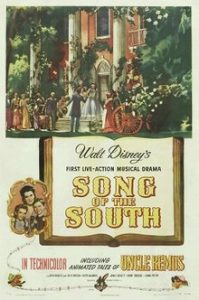Song of the South-1946
Director Harve Foster, Wilfred Jackson
Starring James Baskett, Billy Driscoll
Scott’s Review #893
Reviewed May 4, 2019
Grade: B+
Song of the South (1946) is a Walt Disney film buried in the chambers of cinema history, reportedly an embarrassment never too soon forgotten by the legendary producer and his company.
The reason for the ruckus is the numerous overtones of racism that emerge throughout an otherwise darling film.
Admittedly, the film contains a racial cheeriness that cannot be interpreted as anything other than condescension to black folk, and numerous stereotypes abound.
The mysterious appeal of the film during modern times is undoubted because of the surrounding controversies that hopefully can be put aside in favor of a resoundingly positive message and glimmering childlike innocence that resonates throughout the film.
The hybrid choice of live-action and animation is superlative, eliciting a new progressive experience. Given the surrounding controversies, it would be shameful to spoil it.
The film takes place during the Reformation Era in Georgia, the United States of America, a period of American history shortly after the end of the Civil War and the abolition of slavery. It has a pretty Southern flavor and feel.
Seven-year-old Johnny (Bobby Driscoll) is excited to visit his grandmother’s (Lucile Watson) lavish plantation outside of Atlanta along with his mother, Sally (Ruth Warrick), and father (Erik Rolf). He is soon devastated to learn that his father will return to Atlanta for business, leaving Johnny behind.
Johnny plots to run away from the plantation and return to Atlanta but develops a special friendship with kindly Uncle Remus (James Baskett). Uncle Remus enchants the young boy with sentimental lesson stories about Br’er Rabbit and his foils, Br’er Fox and Br’er Bear.
Drama ensues when Johnny feuds with two poor neighbor boys and develops friendships with their sister, Ginny. He also bonds with Toby, a young black boy who lives on the plantation.
Thunderous applause must go to the creative minds who thought of mixing the animations with the live-action drama, resulting in positive and compelling effects.
As Uncle Remus repeatedly embarks on a new story for Johnny to listen to, the audience knows they will be transported into a magical land of make-believe as a precise lesson results from these stories.
Uncle Remus is an inspiring character- it is rare to find a black character written this way in 1946. Often, black characters were reduced to maids, butlers, farmhands, or other servant roles.
While the film does not stray from the course by casting many of these roles, including Uncle Remus himself, his character is different because he is beloved by little Johnny, respected by the grandmother, and treated as part of the family. His opinion counts for something and is not merely dismissed as rubbish.
The musical soundtrack to Song of the South is particularly cheery and easy to hum along to. The most recognizable song is “Zip-a-Dee-Doo-Dah,” which recurs several times throughout the feature. The best rendition is at the end, when the mix of live-action and animation culminates with the sing-along.
My favorite appearance is when the “bluebird” referenced in the lyric comes into play, resting on one character’s shoulder, true to the lyrical content.
The accusations of racism are justified as keen viewers will understand the condescension towards blacks in several scenes.
More than once, a parade of black people is seen traipsing through the plantation, singing songs, not precisely cheerfully but not despondent.
The scenes have eerie slavery overtones- despite the black character’s all presumably being free to come and go, the reality is they all work for white folk. The black plight and struggle are completely sugar-coated and dismissed.
The animated characters are voiced by strong ethnic voices and are presumed to be ridiculous. The usage of a Tar-Baby character, ultimately enshrined in black tar, seems offensive, almost teetering on the implication of promoting a blackface minstrel show moment as the character, once white, is then turned black because of the tar.
Song of the South is not the only film of its time to face racist accusations- the enormous Gone with the Wind (1939) and Jezebel (1938) faced similar heat.
Song of the South (1946) is recommended for those who recognize the existing racism and appreciate the film’s artistic merits. Wise and resounding friendships between white and black characters are evident, and it is a lovely story about determination, fairness, and respect.
The film should be treasured for its lovely moments and scolded for racist overtones.
Oscar Nominations: 1 win-Best Original Song-“Zip-a-Dee-Doo-Dah” (won)
